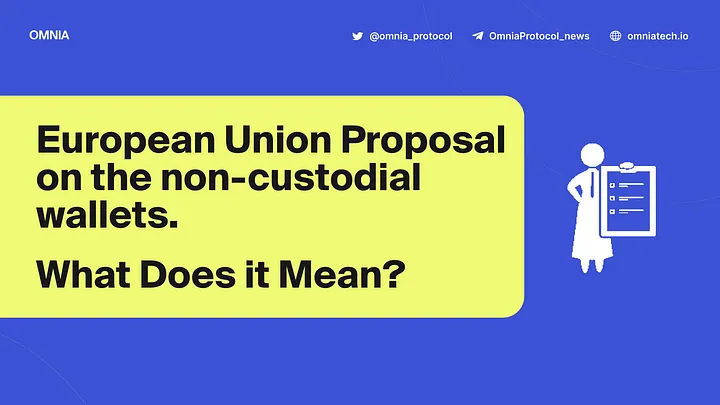
EU’s Proposal on the Non-Custodial Wallets. What Does it Mean?
Cryptocurrency transactions are unique because anyone can send funds over the blockchain without declaring additional personal information such as your name, home address, phone number, or the purpose of your transaction.
The ease and almost anonymous nature of transactions on the blockchain have raised concerns from global regulators. They fear criminals can use digital assets to evade standardized methods of transmitting money through traditional institutions such as banks and remittance companies. More so given that we live in an era where criminals and terrorists are looking for ways to move their funds without ringing multiple alarm bells that have been put in place in traditional financial services, to monitor their illicit activities.
EU Parliament Passes Proposal to Collect Personal Details When Transacting Crypto Through Non-custodial Wallets.
Such possibilities of cryptocurrencies financing terrorism and aiding criminals in their money laundering activities recently led the European Union to draft proposed legislation targeting the anonymous nature of non-custodial wallets.
These wallets, also known as self-custody or unhosted wallets in the EU Proposal, include the popular hardware and software wallets of MetaMask, Ledger Nano S, Trezor, imToken, and MyEtherWallet, which allow their users to own their private keys.
The proposal ‘for a regulation of the European Parliament and of the Council on information accompanying transfer of funds and certain crypto-assets’ recommended the following procedures and measures when transacting with non-custodial or self-custody wallets.
- The crypto-asset provider to obtain and retain the required originator or beneficiary information from their customer, whether originator or beneficiary.
- Crypto transfers exceeding EUR 1,000 are to be accompanied by the information of the originator and beneficiary.
- The crypto-asset provider to verify the accuracy of the information only with respect to its customer and is not expected to verify the required information with respect to the originator or beneficiary behind the unhosted wallet.
- The crypto-asset service provider should, on a risk-sensitive basis, assess whether a transfer of crypto-assets should be rejected or suspended and whether it is to be reported to the Financial Intelligence Unit (FIU).
- Crypto transactions exceeding EUR 1,000 shall be accompanied by additional personal information from the originator and the beneficiary.
In short, the EU Proposal suggests that the crypto industry adheres to existing Know Your Customer (KYC) and Anti Money Laundering(AML) processes and procedures commonly used in traditional financial services such as SWIFT and bank transfers.
The EU Proposal Does Not Directly Ban Self-Custody Wallets.
On March 31st, 2022, the European Parliament’s Committee on Economic and Monetary Affairs (ECON) voted for the proposal mentioned above.
To note is that the proposal does not mean a total ban on non-custodial wallets in the European Union. Peer-to-peer transactions will still be allowed between individuals or entities using non-custodial wallets without needing a third party such as a crypto exchange or other crypto-service providers.
Paul Tang, an MP of the EU, clarified this fact on Twitter through the following statement:
…in today’s vote we will not be banning anything. Instead we oblige verification to prevent crime and corruption through unhosted wallets. Crime and corruption aren’t innovation, I’m sure a law-and-order party like the German EPP would agree?
Potential Impact and Risks of the EU’s Proposal on the Crypto Industry.
However, the EU’s attempt to introduce KYC (Know Your Customer) and AML (Anti Money Laundering) procedures when using non-custodial wallets will significantly affect the global crypto industry if implemented.
To begin with, if the proposal turns into law, the only crypto wallets that fit the requirements of the EU will be the ones that collect the personal information of users, such as those by crypto exchanges. Consequently, crypto users will have no other alternative than to comply with the KYC and AML requirements when accessing critical services such as converting their crypto into fiat for everyday use.
Secondly, the requirements set by the EU mean that crypto exchanges and digital asset service providers will have the arduous task of creating and maintaining databases of users’ personal information and their transactions. The significantly high expenses of such additional operations will most likely force crypto exchanges to pass on the cost of the additional infrastructure to their users through the increment of transaction fees.
Thirdly, small crypto service providers who will not afford additional infrastructure for such databases might refuse all transactions to and from self-custody wallets. Such a scenario would lead to a drop in the competitiveness of smaller crypto companies leading their EU users to turn to other more established crypto service providers.
Fourthly, and as pointed out by the team at Unstoppable Finance, the implementation of the proposed KYC and AML procedures by the EU ‘will create massive personal data honeypots, both within private crypto companies and government agencies.’
This, in turn, will mean that your personal data, such as name and address, will now be linked to your public blockchain addresses and entire transactional history. Would-be criminals will now have a faster, more efficient way of figuring out who has a large bag of crypto and how to kick-start malicious Web3-centered attacks such as phishing, hacking and direct extortion (kidnappings and the use of violence).
The Proposal is Yet to Become Law, but There is Still Hope.
However, the proposal by the EU requiring the implementation of KYC and AML procedures when transacting with non-custodial wallets is yet to become law.
The initial parliamentary vote of a proposal is then followed by a trialogue discussion between the European Parliament, the European Commission, and the European council. This process usually takes a couple of months and is the last opportunity for any changes to be introduced by individual members of the three European government entities.
In addition, during this stage, the public and concerned stakeholders such as crypto exchanges can also initiate lobbying efforts to modify the proposal to reflect a more realistic and favorable approach towards regulating crypto transactions in the region.
Regulation of Digital Assets in the EU is Inevitable
With respect to the growth and magnitude of the crypto-markets, a recent report by the European Central Bank stated that the industry’s interconnectedness with the broader financial system has been growing. But ‘linkages between crypto-assets and the Euro area banking sector have been limited so far.’ This statement could be interpreted to mean that the ECB is yet to view the industry as a significant threat to the region’s financial stability.
At the same time, the ECB report highlighted a need for regulation, but it will most likely ‘not be applied before 2024 at the earliest, as it is not expected to be applied until 18 months after it enters into force.’
The call for regulation was further reiterated by the EU’s Finance Commissioner, Mairead McGuiness, in a commentary on TheHill.com. She said:
Cryptocurrency is going mainstream…More and more investors — including many young people — are dabbling in the crypto marketplace, lured in by social media, promises of high returns and the prospect of building a new, open and innovative financial system. But investments in volatile digital currencies can be risky.
The Executive Order signed by President Biden on March 9 charts the way for U.S. regulation of crypto assets. The European Union (EU) is in the final stages of introducing comprehensive rules for crypto-assets. But crypto is global and our approach needs to be global, too.
I believe that the EU and the U.S. can together lead the way on a shared international approach to regulating crypto. Together, we can enable innovation in finance, while protecting consumers and maintaining financial stability.
Conclusion
In a nutshell, the EU Parliament’s proposal to require KYC and AML procedures when transacting with non-custodial wallets has been interpreted by many as a total ban on such transactions within the region.
An in-depth review of the proposal has revealed that the primary motivation of EU Legislators is to make it harder for terrorists and criminals to move their funds using digital assets.
But the well-intending measures could result in a scenario where crypto innovation in the EU grinds to a halt due to the ripple effects such extreme measures would have on crypto service providers and users.
The proposal is yet to become law. There is still time for the public and other stakeholders, such as crypto exchanges, to lobby for the rejection of the proposal or for reasonable amendments that reflect the reality of the industry.
Legislators in the EU also need to be made aware that crypto transactions are traceable on public blockchains, as highlighted with examples related to the Bitfinex hack, the Axie Infinity Exploit, and the IOTA heist. Therefore, extreme regulations might not be necessary as the majority of blockchain transactions can be tracked.
But as much as the crypto community wants the EU proposal rejected or modified, it is the first sign of an attempt to regulate the industry. The proposal indicates that governments worldwide are watching the crypto industry to understand it better and eventually issue regulations that protect investors from its volatile markets and malicious actors such as scammers and hackers.

